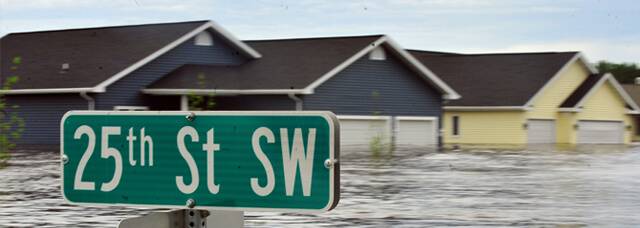
Much of Eastern and Northern Iowa have been affected by severe flooding this Fall. The communities affected have taken some major precautions to help protect as many residents’ homes as possible. The Cedar River in Cedar Rapids spilled over its banks last week, trumping this the worst spillover that Cedar Rapids has seen since 2008. The Cedar River also affected Cedar falls further north, flooding many neighborhoods, parks, residential communities, and commercial businesses near the river.
When living in communities with common severe flooding, it’s important that you have a game plan in place to deal with the disaster before it strikes. Always stay alert, and listen to your town’s emergency response plan. It’s better to be more prepared than to put yourself and your family at risk later on.
Evacuate
Always be aware of the news and the river levels in your town. The National Weather Service will issue a flood watch or a flood warning for areas that will be affected. Be aware of which neighborhoods should evacuate first due to the river cresting.
Find High Ground
When you evacuate, immediately move to higher ground and stay there until the water has receded. Floods come at unexpected times due to severe heavy rainfall in communities north of you. Just because it didn’t rain in your town, doesn’t mean your town won’t be affected by severe flooding.
Avoid Flood Waters
Ready.gov provides many safety tips for weather-related emergencies. They always say “Turn Around, Don’t Drown!” You should always avoid walking or driving through floodwaters as there could be an unexpected current that could wash away you or your vehicle. If you see moving water up ahead, do not attempt to drive through it. Turn your vehicle around and find high ground.
Know the Signs
When a Flood Watch is issued in your community, this means you should be aware because the conditions show that there could be potential flooding in your community. If you live at flood stage or below, you should immediately take precautionary measures and assume that the flood will affect your area. Move all important and valuable belongings to the highest floor in your house, and bring any outdoor belongings inside your home.
When a Flood Warning is issued, this means you should immediately take action and evacuate before the floodwaters reach you.
Be Prepared
If you live at flood stage, preparing an emergency kit can help you in times of need. You don’t want to wait until the last minute to gather your things because you could get trapped out in the rushing floodwaters and not be able to move to higher ground. Your emergency kit should include a flashlight, first aid supplies, cell phone chargers, and emergency cash.

